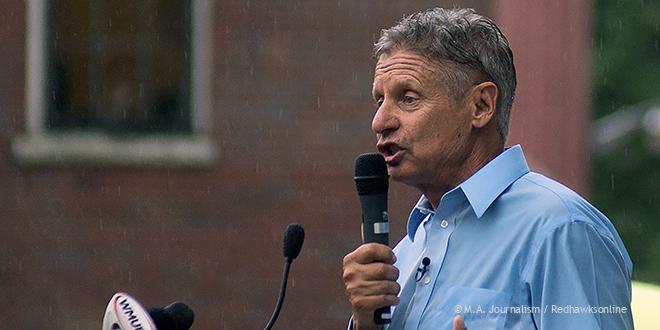Don’t vote for the ‘lesser evil’
“The alternate domination of one faction over another, sharpened by the spirit of revenge, natural to party dissension…is itself a frightful despotism.”
George Washington warned the country in his farewell address that falling into a two-party system is a danger to be discouraged and restrained. Fast-forward to today, when the Democratic and the Republican parties dominate the political landscape.
There is enormous pressure to vote for one candidate from these political parties, and stigma against voting third party.
However, RealClearPolitics, a non-partisan political news website, recently found from an average of nine polls that Donald Trump has a 61.1 percent unfavorability rating and Hillary Clinton comes close behind with 53 percent unfavorable. With such dislikable candidates this election, hearkening back to the first president and voting third party is a choice many potential voters consider, even with myriad arguments against this break from political norms.
It is the duty and right of American citizens to vote for whom they agree with. Voting third party is not wasting a vote, throwing away a vote or giving a vote to your potential major-party opponent. Voting for the lesser of two evils is still voting for evil. For change to be made in this country voters need to take a stand for what they believe in.
“[Voting for] someone who might not be the most likely to succeed, but you agree with the most, I think, is very important,” said junior Isaac Rose.
Voting based on your principles and values is how voters’ voices get heard, it’s taking a stand for what you believe in, whether you are voting for someone who has been defined as “major party” or not. Voting third party, if you agree with a particular candidate, is the right thing to do.
Some would argue that voting third party is throwing away your vote, because it is highly unlikely that a third-party candidate will be elected. Most would agree that Donald Trump or Hillary Clinton is going to be the next president, so is voting third party a waste?
“[It is a waste] unless you take a long-term view,” said social studies teacher David Hoffner. “I would say, maybe what you’re doing is helping to plant seeds of change for your children, or their children.”
A vote that makes a change is never a wasted vote, Hoffner explains: “One way [voting third party makes a change] is it could signal to the main parties’ issues that they need to consider that they’re not.”
“As [third-party candidates] come into the spotlight, we’ll be able to get a much larger spectrum of political ideas,” agreed Rose.
Proponents of voting for major-party candidates also say that one of them will win, so you should choose between the “lesser of two evils.” However, voting for the lesser of two evils overlooks the fact that the lesser of two evils is still evil, and there are other options, as Hoffner explains.
“People just fall into these robotic, trance-like movements where they’re like, ‘I just have to pick one’ and I would say, ‘no you don’t!'” said Hoffner, “You can vote your conscience, and if people will not break out of that mentality, at some point you would want to say, ‘I’m not willing to pick the lesser of two evils, because guess what? They’re still evil.'”
It may seem to the prospective voter that voting third-party is like casting a vote for the opponent of the major-party candidate they would vote for if they had to. For example, if a voter would vote for Hillary Clinton over Donald Trump, they may vote for Clinton simply because they feel that voting third party would be like voting for Trump.
However, this year, it is entirely possible that Democrats and Republicans will vote third party, and therefore cancel out each other’s votes. A Republican voter who is particularly concerned of this may find a Democratic voter (or vice versa) and make a pact that they will vote third party, canceling each other out.
The election of 2016 will go down in history. Authors are writing books all over the country about the polarizing nature of the two major party candidates. Mud-slinging and name calling seems to be at an all-time high, or as some might say, an all time low. Is now really the best time to vote third party?
“If not now, when?” asked Hoffner. “I literally mean that. If you’re not pushed to the point where you’d say, ‘I’m dissatisfied with these two options,’ I don’t know when you would [vote third party], if not now.”
It is election day, and it is time to vote. This year is the year to vote third party, the year to vote your conscience. The only wasted vote is the unprincipled vote. Voting third party is not a wasted vote, it is making a statement. It is planting seeds of change that may one day grow into a democracy that doesn’t confine itself to two dislikable people. It is the American citizen’s voice.
Do not murmur, do not mutter, do not whisper, ‘Fine, I will vote for Hillary,’ or ‘Fine, I will vote for Trump,’ if that is not who you agree with. Shout: ‘I will vote third party. I will have my voice heard, and I will walk out of the voting booth knowing that I have made a small step, yet as large a leap as I can make, toward change in what in many ways is a broken country.’ Vote based on principle and value, and wear your ‘I voted’ button proudly.

